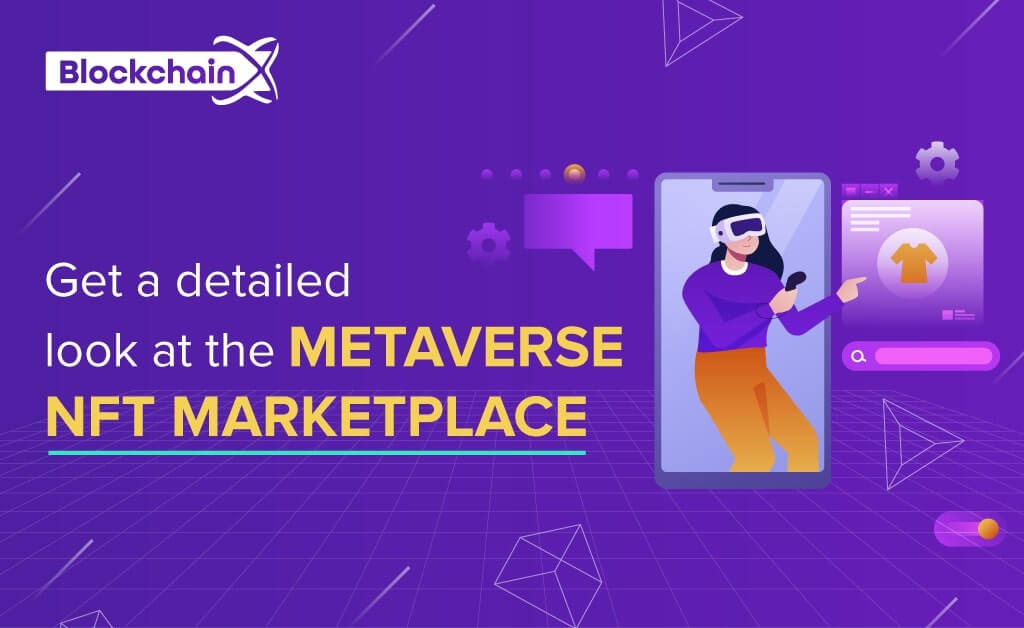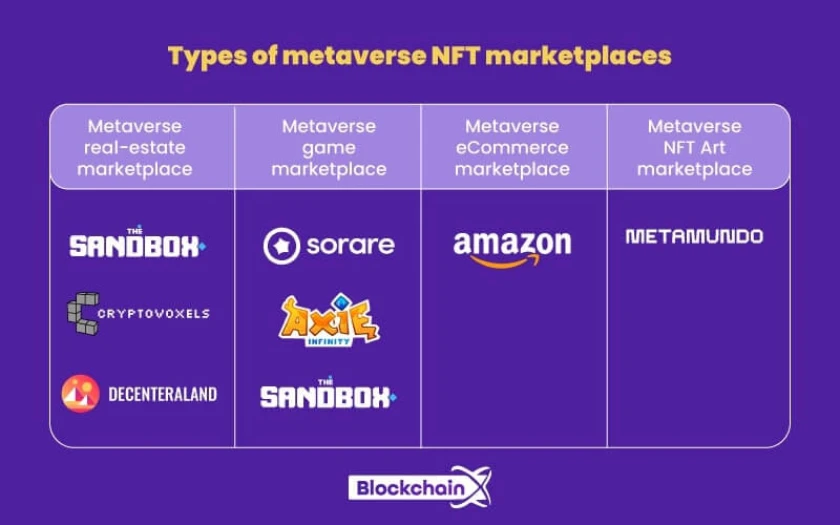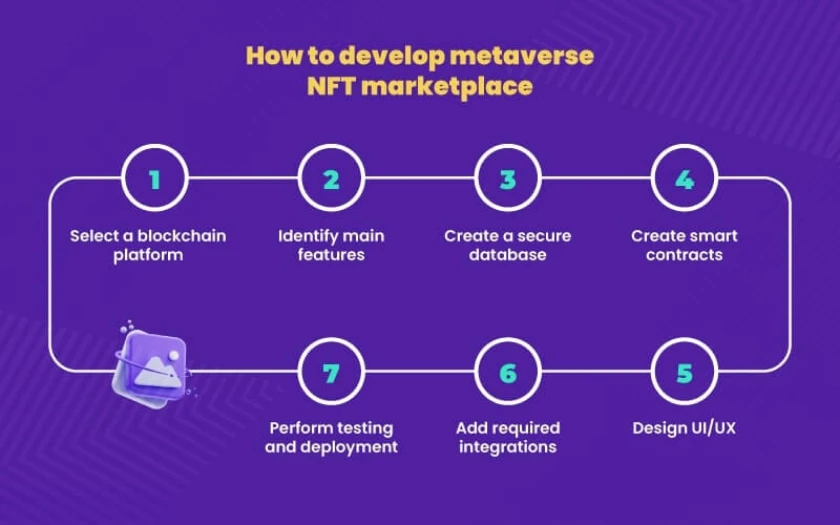
Explore the opportunities in virtual space at the Metaverse NFT Marketplace
Have you noticed how much the world has changed over the last few years? Being a successful entrepreneur used to imply expanding your business on both an offline and online platform. You now have far more opportunities if you also enter the third space — the Metaverse. One of the most visible ways to do so is through the Metaverse NFT marketplace development.
Considering that this platform is still underexplored among non-technical business leaders, it has the potential to affect a company's competitiveness in the future. Thus, Let’s not delay the growth of your enterprise, let’s learn about the metaverse NFT marketplace and how it can benefit your business.
What is a Metaverse NFT marketplace?
The Metaverse NFT Marketplace is a blockchain-based solution that allows users to instantly tokenize and trade their one-of-a-kind digital assets in the metaverse space while also providing a decentralized experience. It functions similarly to the established NFT marketplaces you're probably familiar with, only in the virtual space of the metaverse. Users can trade digital lands, avatars, in-game items, and other digital assets on the metaverse NFT marketplaces.
Companies can expand their service offerings and attract new customers who are currently exploring metaverse opportunities by integrating their NFT marketplaces into metaverse projects.
What are the characteristics of the Metaverse NFT marketplace ?
The following are some of the distinctive features of the metaverse NFT marketplace development:
Decentralization means that no intermediaries are required in the trading process.
Interoperability or the ability to provide users with a consistent experience as they navigate various independent marketplaces.
Immersive Environment Users can socialize and trade in a realistic 3D environment.
Compatibility with NFT wallets allows users to purchase, sell, and store digital assets.
Seamless Tokenization allowing users to easily tokenize their assets in order to gain unique ownership and sell them on the metaverse NFT marketplace.
What are the advantages of Metaverse NFT marketplace ?
You can expand your business and attract more users to your platform by combining the Metaverse and NFT. You will be able to reach out to more people and increase your sales by using the metaverse NFT marketplace.
Other benefits include:
Security All transactions in the metaverse NFT marketplace will be secured by the blockchain.
Transparency means that users can view every transaction that occurs on your marketplace.
Growth opportunities abound due to the fast-evolving metaverse market and the NFT craze.
Seamless trading experience for clients.
No intermediaries and assets are transferred quickly.
Quick and hassle-free payments are quick and easy because they are made with cryptocurrency and do not require credit card information.
Types of Metaverse NFT marketplaces

There are currently four main types of metaverse NFT marketplaces: Metaverse real estate, Metaverse eCommerce, Metaverse gaming, and Metaverse NFT art. Let's assess each one in more detail.
Metaverse Real estate marketplace
Users can buy and sell virtual property in the metaverse using marketplaces for the metaverse. Users must place a bid and then pay for a specific digital property in order to own it.
Some real estate companies also use an NFT-powered digital version of physical properties to showcase them. This enables avatars of potential buyers to visit the property and thoroughly inspect it before buying it. Buyers legally acquire ownership of the physical property in the real world when the contract is executed in the metaverse.
Metaverse game marketplace
Metaverse game marketplaces are popular due to the new "play to earn" concept, which is highly prevalent among gamers. While playing, players can earn in-game assets in the form of NFTs. Earn-to-play game players can also withdraw NFT items from their wallets. Users can use metaverse game marketplaces to trade their gaming characters, accessories, and in-game assets.
Metaverse eCommerce NFT marketplace
The Metaverse eCommerce NFT marketplace enables users to visit shops and check out various products with the help of their VR devices. Users can also use their avatars to try on different outfits, cosmetics, and accessories. As a result, metaverse eCommerce marketplaces can provide realistic buying experiences similar to those found in the real world.
Metaverse NFT art marketplace
The NFT art marketplace is a multibillion-dollar industry. For example, OpenSea, one of the largest NFT marketplaces, is expected to have a trading volume of $3.2 billion in the second quarter of 2022. NFT art marketplaces can provide even more interactive and appealing experiences for users to explore a range of artworks by leveraging the metaverse. For instance, users' avatars can visit virtual exhibitions of well-known NFT artists, explore their works, and take part in actual NFT art auctions.
A Detailed Guide to the Metaverse NFT Marketplace

To build the metaverse NFT marketplace, you must follow these seven steps. Let's go over each step in detail to get a better understanding of the development process.
Step 1: Choose a blockchain platform
You must choose the blockchain network that will serve as the basis for your metaverse NFT marketplace. The Ethereum blockchain is used in the majority of current metaverse-like projects. Cardano and Polkadot, third-generation blockchain ecosystems, are Ethereum's main rivals.
There are numerous factors that may influence your choice, including the platform's consensus mechanism, transaction speed, and transaction cost.
Step 2: Identify the main features
Choose and prioritize the main features that will serve as the basis for your NFT marketplace in the metaverse. Users frequently demand features such as simple tokenization, secure peer-to-peer transactions, interoperability, 3D display, auction and sales functionality, and NFT wallet integration.
Step 3: Create a secure database
The implementation of an immutable and secure database to hold the sensitive and private data of the user and admin profiles is the next step in the development of the metaverse and NFT.
To store NFTs with their unique metadata, you'll also need the IPFS (Interplanetary File System).
Step 4: Create smart contracts
Blockchain, due to its decentralized nature, does not require any intermediaries to control the platform. Instead, smart contracts are used to regulate and carry out the operations. Smart contracts are programs that run when certain conditions are met and are stored on the blockchain.
Smart contracts will help to ensure transaction transparency, traceability, and irreversibility on your metaverse NFT marketplace. The functionality of smart contracts will be determined by the requirements and technical aspects of your metaverse project and should be in line with the features that your project intends to include.
Step 5: Create UI/UX
Engage UI/UX experts to design an appealing yet simple interface for your metaverse NFT website. Focus on simplicity and responsiveness to provide the best user experience possible. When navigating the marketplace, your users should feel confident.
Step 6: Include any required integrations
Following that, you should map out the necessary integrations based on the defined functionality. To make the marketplace operable, these are likely to include integration with the wallet, payment gateway, and dApps.
Step 7: Carry out testing and deployment
The final step is testing, ensuring there are no bugs, glitches, or other defects associated with the marketplace. When testing is complete, you can begin deploying your product.
Closing thoughts
NFTs and the Metaverse complement each other by creating more opportunities for business growth. So now is the perfect time for companies to invest in this cutting-edge technology and create exclusive NFT marketplaces and Metaverse. They are able to give their users a better experience by letting them explore the available products and services in a realistic, 3D environment.





